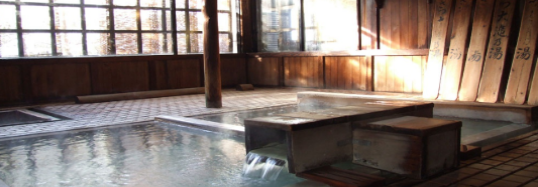
Japan Hot Springs
From the ancient times Japanese people were in harmony with nature. This is obviously seen in every sphere of life. Clothing, dishes, utensils, traditions and all things are full of nature elements, that is to say, this can only be perceptible by Japanese people.
One of the modern forms of Japanese leisure is «isolation from civilization». Currently this means visiting «onsen» hot springs. This is the most wonderful place with modern facilities where people can feel the close connection to nature.
In European culture «onsen» is a hot spring which is considered to be baths, massages, skin masks, therapy and other healthy services. This is usually the same as European fitness complexes. The differentiating feature of Japanese hot springs is that they are of nature origin. This is obvious from the word «onsen».
Usually hot springs are located completely in isolated places, far from modern mega policies. They are located close to the forests, mountains and lakes. «Onsen» is a hot spring pushed out under the ground. There are ryokan Japanese style hotels near the all hot springs. These hotels help people to feel the full connection with nature. Here everything complies with one entire objective, that is, the connection from the rest up to the nature. The classic scene from hotel window is the sea, mountains and the forest.
In some springs the connection with civilized world is very conditional. For instance, in«Aoni onsen» spring, located in Aomori prefecture, there is no electricity at all. The building is lit with kerosene lamps. Of course, there is no mobile phone connection, too. In winter people have to sit snow-mobiles in order to get the nearest Kuroishi city. Moreover, the mountainous regions are covered with 5metre snow-layer. In these hotels bushes and roots typical to this season are served during supper. They are gathered from nearby surroundings. The hotels serve also fish hunted several hours ago near the mountainous river. Accordingly, the river murmur and the light of kerosene lamps make the surrounding to be in unique with medieval atmosphere. All of these are the differentiating specifications, importance and features of springs. Moreover, every year a lot of tourists come here from central cities of the country.
Every spring is registered and certificated. A sheet is posted in a visible corner where people can see the minerals dissolved in water, using instructions and other intricate effects. Usually people with weak heart and high blood pressure are not allowed to visit hot springs. Springs are of different temperature, different minerals and of different concentrations. Many healing springs, the so-called «toji-no-yado», are famous with their healthy features not only in Japan, but outside the country borders, too. For example Tamagavwa spring in Akita prefecture has hydrochloric acid dissolution. It is famous place where cancer can be treated. Here a lot of people come from different corners of the world. The spring is so active that throwing a steel table knife into the water and keeping it there about 12 hours then the knife will completely be corroded. Accordingly, it needs to stay into the water not more than 3-4 minutes.
However, Japanese people go hot springs mainly for having a rest. They try to overcome the fatigue and enjoy nature. There are also special tours for visiting 5-6 springs of different regions of the country.
A visit to hot spring is a real ceremony with a special attitude. Accordingly, breaking this attitude is completely unpleasant phenomenon. Hot spring is a social place where people have a rest far away from big noisy cities. Actually, noisy conversations, water games are strictly prohibited. Before entering the spring water it needs to have a bath. It doesn’t need to make a noise in spring or to swim or sink into the water with noise. The above mentioned attitude will disturb the rest of the others who come here and enjoy nature.
Currently visiting hot springs is accepted not only by Japanese people, but by foreigners, too. A lot of hotels or ryokans have foreign staff in order properly serve the tourists.
the material is taken from http://visitjapan.ru/japan/gorjachie-istochniki/
translated from Armenian into English by Tatev Harutyunyan










